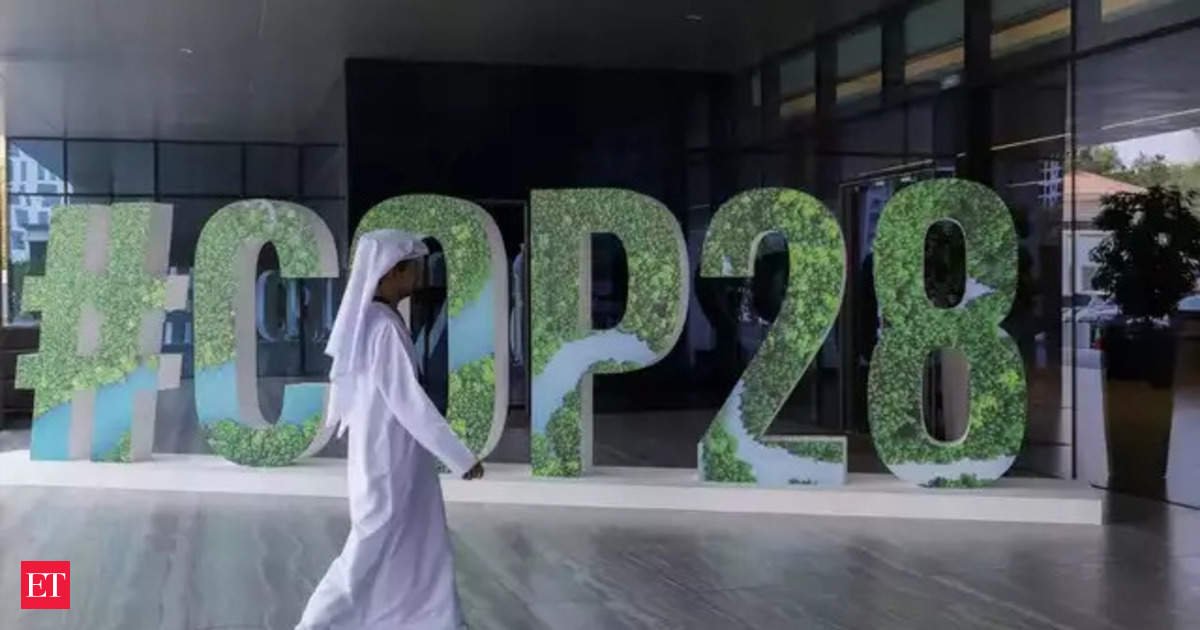As nations head to UAE this week to negotiate on climate targets at the COP 28, India, even as it is committed to climate action, has also drawn its red lines – especially on coal, sector-specific targets, setting of new targets on cooling and new multilateral platforms.
The most prominent sticky point is the mention of ‘fossil fuel’ phase out/down in the draft text for upping ambition on renewable energy- the latter, a key agenda of the UAE COP Presidency, ET has learnt.
It is gathered that while India is agreeable to tripling of Renewable Energy targets and has been conveying commitment to the cause including at the G20, it is negotiating hard on the text in the preamble to the proposed COP 28 declaration for the same.
Fossil fuel is a clear red line for India which is still a developing economy, dependent on coal for 70% of its electricity supply and yet to peak in emissions.
India is of the view that there is no need to make any mention of fossil fuel in a declaration focussed fully on commitment to Renewable energy.
India is also disinclined to sign up for the proposed COP 28 Global Cooling Pledge- to reduce cooling-related emissions across all sectors by at least 68% globally by 2050 vis a vis 2022 levels.
India, already a signatory to the Montreal Protocol on reducing use of Hydro Fluoro Carbons (HFCs) and other coolants used in refrigeration and air conditioning, feels there is no requirement for yet another framework on the same.
Similarly, the Coalition for High Ambition Multilevel Partnership (CHAMP) proposed for COP 28 has not enthused India much.
CHAMP looks at linking the Nationally Determined Contributions (NDCs) to all levels of government- taking climate action to every tier of governance for NDC updates.
India is of the view that the NDC implementation and updates are sovereign functions, as agreed in the Paris COP. Bringing in another multilateral layer over and above the existing UNFCCC framework is not seen as the best approach.
The leader-level Emirates Declaration on Sustainable Agriculture, Resilient Food Systems, and Climate Action for a voluntary commitment to incorporate food systems and agriculture into NDCs and National Action Plan by 2025 does not fit into the Indian philosophy on food sustainability and food security, those part of negotiations at COP 28 told ET.
There are also sensitivities around the issue of food subsidies vis-a-vis the principles of Common but Differentiated Responsibilities (CBDR) which are there in the backdrop.
India is also learnt to have expressed concerns over some parts of the COP28 Declaration on Climate and Health pertaining to emission reduction in the health sector. This proposed declaration calls for assessing the greenhouse gas emissions of health systems, and bringing procurement standards for national health systems, including supply chains.
India, has in principle, always maintained its commitment to overall emission reduction without sectoral specificities which may vary across nations. It has sought modulation of the language on this front, in the last rounds of negotiations, ET gathers.
On December 5, the COP has lined up a high-level roundtable on hydrogen to boost scale up of cleaner fuel. It intends to also launch a ‘Declaration of Intention mutual recognition of certification schemes’ for hydrogen derivatives and the ISO methodology for greenhouse gas emissions assessment for hydrogen. India has expressed some concerns on the methodologies for hydrogen certification and it is expected they will largely be ironed out, paving way for India’s participation.
The issue of climate finance-related COP28 endorsement is also running into the last overs with the department of economic affairs calling for specific mention of the CBDR principles.
The other big ones, of course, are the ‘Global Stocktake’ report which will be unveiled at COP28 and lead the debate on climate ambition.
On Loss and Damages Fund, the recommendations of the Transitional Committee will be deliberated upon. India’s key position here is seeking beneficiary status for developing nations as well, besides the small island nations and least developed countries.

